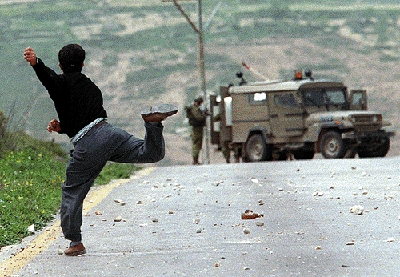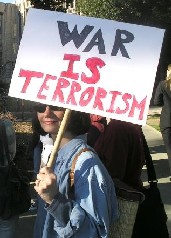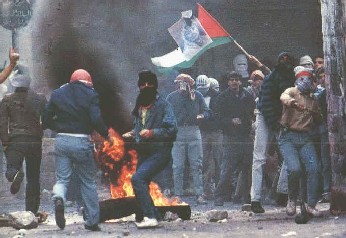|
The old adage "one man's terrorist
is another man's freedom fighter" was brought to the
fore last September during a gathering of world leaders
at the UN commemorating the 60th anniversary
of that controversial body.
On the
table for discussion amongst other topics set-out in a
paper titled "Goals for the Millennium" was the thorny
issue of terrorism. Although all members of the General
Assembly could agree that terrorism in all its forms
should be condemned, they could not concur on what
constitutes terrorism. The question is this: Will they
ever be able to reach a consensus?
Without a
generally accepted definition of 'terrorism' it is
almost impossible for nations to work together to combat
the growing international threat. But achieving
universal agreement is an uphill struggle, mainly
because each country views the topic subjectively with
its foes being labelled 'terrorists' while its friends,
which often carry out the self same acts, falling into
the good and upright category.
While it's
true to say that there were many differences between
nations in their individual perception of terrorism and
the terrorist labelling of various groups, the main rift
was between the West and the Muslim world.
For
instance, the majority of Muslim countries are adamant
that "resistance against occupation" is a God-given
right, which translates to those fighting the occupiers
in Palestine and Iraq should not be deemed "terrorists".
In this
connection, Syria called for the root causes of
terrorism to be investigated while other Muslim nations
argued that military operations which resulted in large
numbers of civilians being killed constitute
"state-sponsored terrorism".
In
response to these embarrassing calls, the
newly-appointed United States Ambassador to the UN John
Bolton – a neo-con who earlier showed his contempt for
the institution - was eager to keep states out of the
equation. He wanted to ensure that the final text
concerning terrorism was limited to terrorists "and does
not address military activities that are appropriately
government by international humanitarian law."
In other
words, occupying nations are eager to get themselves off
the hook but this policy could backfire if Bolton's
definition of terrorism were to be internationally
accepted. Then rogue nations or nations which brutally
repress their citizens and eschew civil liberties and
human rights could also benefit under the same
protective umbrella.
Imagine if
Bolton's provision had been in force during the South
African apartheid era? In that event, the then all-white
government would have been immune from international
condemnation and, presumably, Nelson Mandela, arguably
the finest statesman the world has ever known, would
still be locked up in his Robin Island cell.
Again, if
we accept this reasoning Slobadan Milosovich, the former
leader of Yugoslavia, would still be in power while
groups which opposed his alleged policies of ethnic
cleansing would feature on terrorist lists.
Furthermore, Saddam Hussein's repression of the Kurds
and Shiites would be legitimized while the leaders of
their various uprisings would be terrorists, and East
Timor would still be in Indonesian hands, its current
leader in jail.

The US has
been particularly adept at protecting its own by
refusing to accept the jurisdiction of the International
Criminal Court and browbeating smaller countries to
sign-up to bi-lateral agreements whereby members of the
US military cannot be arrested, extradited or prosecuted
for war crimes on their soil.
The UN
couldn't agree but the US State Department's preferred
definition of terrorism is: "Premeditated, politically
motivated violence perpetrated against non-combatant
targets by sub-national groups or clandestine agents,
usually intended to influence an audience."
On the
surface of it, Britain's SAS could fall into this
category judging from the behaviour of two of its agents
in Basra, who, dressed as Arabs and driving a vehicle
full of weapons and explosives, shot at Iraqi police
when asked to stop at a legitimate checkpoint. Weren't
they "clandestine agents", after all?
Thereafter
the British army could be considered as colluding with
terrorists when it drove its tanks into the walls of a
Basra police-station so as to free the two British
agents. Indeed, an Iraqi minister has described these
acts as "terrorism".
Britain
has signed up to the International Court and is
particularly vulnerable to these charges, especially in
light of Iraq's sovereign status and the invasion of
Iraq being pronounced "illegal" by Kofi Annan.
The former
Malaysian leader Dr. Mahathir Mohammed is clear on the
subject. Accusing the Western coalition of state
terrorism at a recent human rights conference, he pulled
no punches.
"The
British and American bomber pilots came, unopposed, safe
and cosy in their state-of-the-art aircraft, pressing
buttons to drop bombs, to kill and maim," he said.
"And these
murderers, for that is what they are, would go back to
celebrate 'Mission Accomplished'," he continued, asking,
"Who are the terrorists? The people below, that were
bombed, or the bombers?"
Critics of
the Israeli government would, no doubt, be sympathetic
to Dr. Mahathir's diatribe against Western
state-sponsored terrorism.
The State
of Israel was born on the back of terrorist acts
committed by the Haganah, the Irgun and the Stern gang
when 70 per cent of Palestinians were ethnically
cleansed from their villages and towns.
One of the
prominent members of the Stern gang was Yitzhak Shamir,
who was later appointed the Prime Minister of Israel
even though he had organized the assassinations of Lord
Moyne, the British Minister Resident for the Middle East
and the UN's Special Mediator on Palestine Count Folke
Bernadotte.
Yet
another Israeli Prime Minister Menachem Begin was the
leader of the Irgun, responsible for bombing Jerusalem's
King David Hotel in 1946 when 91 people lost their
lives, and for the bombing of the British Embassy in
Rome, while Israel's second president led the illicit
Haganah, a grassroots military movement.
Ironically, Israel has mercilessly used Bush's 'War on
Terror' to suit its own ends by classifying Palestinian
militant groups as 'terrorists' at every turn although
they are fighting to free their own occupied lands
against the technological might of the Israeli state.
Evidencing
Israel's double standards was its recent lauding of
survivors from 'the Lavon Affair', so named after the
former Israeli Defense Minister Pinchas Lavon. In 1954,
Jews working on behalf of Israel were found responsible
for placing bombs in Egyptian buildings frequented by
Westerners in the hope that Egyptians would be blamed
when US-Egypt relations would be disturbed.
For
decades, Israel denied any role in this plot but, this
year, made a remarkable U-turn by decorating the
perpetrators and calling them "heroes". Earlier, an
Israeli Commission of Enquiry had found that Shimon
Peres and Moshe Dayan had collaborated to forge a
document which false indicted Pinchas Lavon. For his
part, Peres has consistently denied these charges.
The double
standards here couldn't be more glaring. While Israel
condemns Palestinian militants for exploding bombs, it
celebrates its own bombs set to blow up civilian
institutions by handing out medals and appointing
designated terrorists to lead its nation.
So in the
absence of any internationally-recognized definition of
terrorism, let's check the dictionary.
The
Cambridge Dictionary defines terrorism thus: "(threats
of) violent action for political purposes."
The Oxford
Dictionary states that terrorism is the use of violence
to pursue political aims.
Merriam-Webster's
definition is simply "the systematic use of terror
especially as a means of coercion".
None of
the above excludes states from being pegged as
"terrorist", which means if John Bolton and his masters
get their way a slew of dictionaries will have to be
re-written, enabling the crimes of history to be
whitewashed. For, if governments are immune to charges
of terrorism, then the Nazis, which were the once
elected rulers of Germany, could no longer be held
responsible for the massacre of millions of their own
citizens.
There is
no getting away from the fact that defining terrorism is
one of the most vital and complex issues before us
today. But, even so, there is no resolution in sight.
Britain
manages without a blanket definition of terrorism by
issuing a list of terrorist groups; a list which is
expanding by the day, especially after the attacks on
London's transport system last July. Last October, a ban
on 15 international groups believed to be terrorist
organizations was approved by the British Parliament,
bringing the total number of banned groups to 40.
Almost all
are Islamic organizations. The outspoken Labour MP John
McDonnel said the groups were being banned because their
allegiances had shifted from "pro-Western terrorism to
anti-Western terrorism".


The list
is shortly to be expanded since under a new
anti-terrorism bill groups which glorify terrorism, even
if they are not personally involved in violence, will
also be proscribed. Britain is going one step further by
banning what it terms extremist clerics and is prepared
to close down any mosques or Islamic bookshops it
perceives inflammatory. It also wants powers to strip
nationalised Britons of their citizenship and
electronically tag others.
The US has
Hizbollah, Hamas, the PFLP and Islamic Jihad on its
'terror list' as well as many of those on the British
roll call.
But most
ordinary people don't have lists and do not want to
engage in mental gymnastics over who is or isn't a
terrorist neither do they want to nitpick over
legalisms. For them, the argument is simple and comes
down to this: Civilians should not be targeted by
politically motivated individuals or groups, and neither
should they be cavalierly written off as 'collateral
damage' by rampaging states.
There is
no doubt that the vast majority of people everywhere
were repulsed at the sight of people just like them
hurling themselves from tower block windows on September
11, 2001. And most were equally nauseated at 'Shock and
Awe', purposefully designed to bring terror to the
hearts of patriotic Iraqis, who supported their
government, even when that government was a
dictatorship.
Moreover,
there were few inclined to cheer on those who occupied a
Russian school in Beslan – monsters who thought nothing
of cutting short the lives of young innocents and their
teachers - or, the people who turned Sharm el Sheikh and
Bali into bloodbaths.
Ordinary
people want terrorism to end and want to feel safe when
travelling and getting on with their lives in their own
lands. And they look to governments to ensure their
wellbeing.
On the
other hand, governments have resorted to muscle-flexing,
threats and bluster along with the curtailment of their
citizens' civil liberties in the battle against terror.
Worryingly,
few are prepared to investigate and tackle the root
causes of terrorism. The British Prime Minister Tony
Blair, for instance, sees this as some kind of weakness
and the start of a slippery slope to justifying
terrorist acts. Even though his own Foreign Office, the
respected political think tank Chatham House and the
actual perpetrators of the transport attacks have all
linked those blasts to Iraq, Blair prefers to dig his
head even deeper into the sand and thus deflect any
blame from himself and his cabinet. In an attempt to
hoodwink his own public, Blair puts the blame on some
kind of evil ideology running around the world like a
cancer.
Unfortunately, it is this kind of muddle-headed thinking
on the part of states which is partly responsible for so
much of the frustration felt by young men willing to
blow up themselves and others. None of these young
people were born terrorists and neither did they wake up
one day and decide to pursue a career in terrorism.
Most of
these misguided individuals are motivated by a raging
sense of injustice and while they themselves are driven
to commit crimes against humanity, this does not mean
that their causes aren't just. If, indeed, they are,
then surely those causes should be viewed apart from the
banner-carrying extremists who hold them dear.
Here I'll
throw in my two-penneth. If the world's leaders spent
more time on providing the Palestinians with a state,
the US and Britain issued a time-table for their
withdrawal from Iraq, the Pakistanis and the Indians got
together to seriously resolve disputed Kashmir and the
Russians relinquished their grip on Chechnya, worldwide
terrorism would peter out of its own accord.
Disputes
must be settled and not allowed to fester for decades or
even years. A good example of this is the IRA which has
recently destroyed its weapons' cache because it has
been brought into the political process. I'm no Einstein
yet even I can figure this one out, so why can't
government elites?
The
reality is they probably can but doing so would not suit
their various political agendas and ambitions. Let's
face it. Where would the US be today without the
existence of terrorism? Certainly not in Afghanistan,
Pakistan, the Caspian, the Gulf and Iraq, that's for
sure and Israel would be minus an excuse not to return
to the land-for-peace table. Think about it!
As Brian
Whitaker of the Guardian has written, "Terrorism
is violence committed by those we disapprove of." He may
just be on to something there. United Nations, take
note! | 